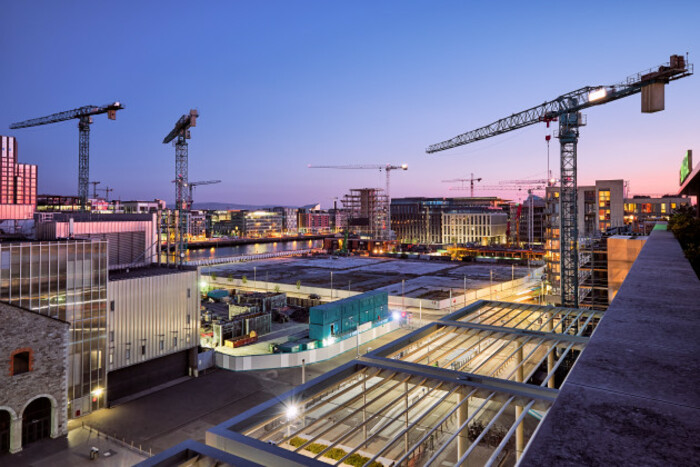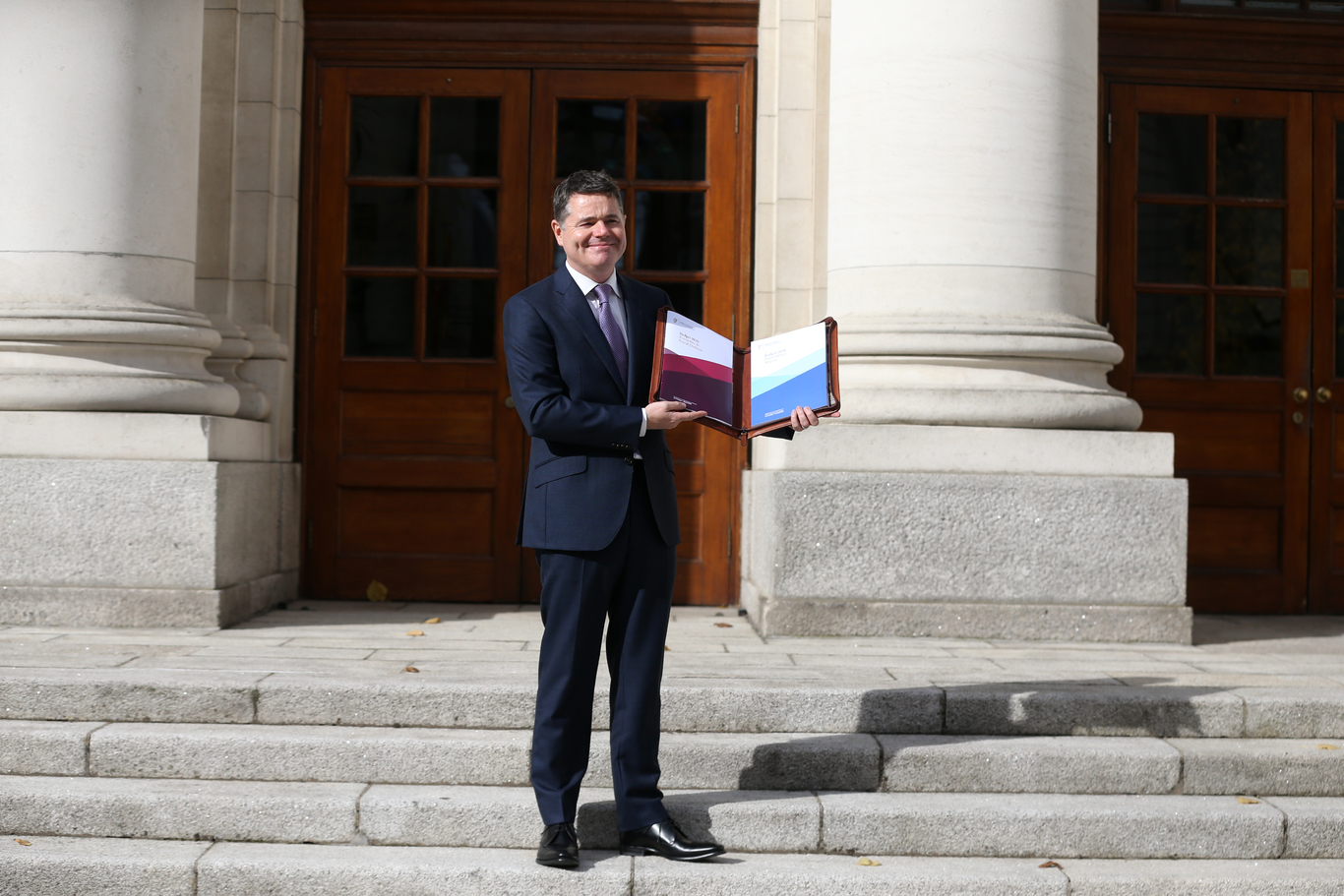Budget 2020: Here are the winners and losers from Irish business
Hotels mourn a missed opportunity, brewers raise a Paschal Pilsner but mostly it’s about Brexit.
NO ALARMS AND no surprises then.
With an eye on what’s happening across the Irish Sea, Budget 2020 stuck to script as Paschal Donohoe followed through on his promise to err on the side of caution as he works “in the shadow” of Brexit.
That doesn’t mean there isn’t plenty to digest for businesses.
Facing up to the worst-case Brexit scenario, the Finance Minister laid out a Brexit contingency plan with actual cash – some €1.2 billion of an overall package, excluding EU funding – behind it.
A no-deal scenario is a major challenge, but it is one that “Ireland has the measure of”, Donohoe said.
There was more than a cursory nod towards climate change with the implementation of a “just transition fund” and a rise in carbon taxes.
“Climate change is without doubt the defining challenge of our generation. We need to prove that we can grow our economy while reducing our environmental impact,” Donohoe said.
Entrepreneurs also got a little bit of love with a number of changes to tax reliefs and small craft brewers have plenty to toast, but hotels aren’t happy.
WINNERS
Businesses worried about Brexit
With news emanating from Westminster this morning sounding a further klaxon, if one were needed, that getting a Brexit deal over the line is highly unlikely, plenty of businesses are braced for a rough few weeks. Donohoe hammered this home, consistently coming back to the unprecedented times we live in.
Not wanting to be seen to be standing idly by, the government’s focus on mitigating the risks for businesses was a major theme this afternoon.
The State has a package of €1.2 billion – excluding EU funding – to work with in response to Brexit. Around €200 million of that will be spent on public service areas like staffing and tech.
If a no-deal comes to pass, €650 million will be made available to support the Agriculture, Enterprise and Tourism sectors and to assist the most affected citizens and regions – with €220 million available to be deployed immediately.
The money will be divvied out all over the country in the form of grants, loans and equity while the food and agriculture sectors and the tourism industry were namechecked for specific plans.
The deployment of the balance of €390 million of “contingency expenditure” is being kept back to be determined closer to the time.
Just in case that is not enough, the rainy-day fund could be used to supplement this, should it be needed.
Ibec, Ireland’s biggest business lobby group, welcomed the package of supports.
“The context of a rapidly growing domestic economy set against the backdrop of Brexit, and international trade tensions, has made Budget 2020 one of the most difficult to formulate in some time. The government has in our view struck the right balance by focusing available resources on those measures which can help insulate the economy from external shocks by investing in critical infrastructure, preparing for Brexit, and improving supports for SMEs,” Danny McCoy, Ibec’s chief executive, said.
The British Irish Chamber of Commerce said the allocation of €1.2 billion to support businesses most vulnerable to a no-deal “will be vital” should a disorderly Brexit come to pass.
However, the Small Firms Association (SFA) has criticised Budget 2020 for not being ambitious enough at reversing the impacts of uncertainty among entrepreneurs in the context of Brexit.
With just 23 days to go, the supports were broadly welcomed, but it remains to be seen if they are enough to get through some frosty months ahead. More reaction on the Brexit measures can be found here.
Entrepreneurs and innovative businesses
After a chorus pointed out some pretty key flaws, the rules around the Key Employee Engagement Programme (KEEP) rules are being loosened.
Introduced with the primary purpose of enabling startups and SMEs to compete with larger organisations and multinationals in attracting and retaining key talent, due to some restrictive conditions KEEP has failed to deliver.
“This is evidenced by recent figures suggesting that less than 60 employees nationwide have availed of KEEP since its introduction in 2018. The changes announced today, especially in terms of making it available to part-time workers, address some of the concerns with KEEP, but more needs to be done to remove the barriers that are deterring startups and SMEs from availing of the programme,” Michael Rooney, a partner at People Advisory Services at EY Ireland, said.
There are also changes coming to the Employment and Investment Incentive (EII) Scheme, which will now be available for investors in full in the year of investment – as compared to 75% in year one and 25% in year four, while the maximum investment per year has been increased from €150,000 to €250,000.
Keep an eye on the finance bill for the full details, as the EII has proved a tricky one to access for some business.
The research and development (R&D) tax credit regime for SMEs was also on the agenda, with an increase in the rate to 30% for micro and small businesses, and increasing the 5% restriction to 15% for outsourcing R&D to universities to foster greater collaboration between academia and industry.
“The amendments to the R&D tax credit regime heralded by the minister are a welcome step in the right direction in terms of supporting small, indigenous Irish businesses and allowing innovation to prosper within our star-up and scale-up eco-system. The relief is an important stimulus for investment and in creating new and sustaining existing employment,” Caroline O’Driscoll, a tax partner at Deloitte, said.
Capital gains tax (CGT) was name-checked, but no changes for now.
Have a look here for more Fora analysis on how from a startup perspective, it could be the most positive in a generation, but the “devil will be in the detail” of the Finance Bill.
The self-employed
The minister is increasing earned income credit by €150 from €1,350 to €1,500.
Electric car fans
With electric car sales on the rise, the zero rate of benefit in kind for electric vehicles was extended to 2022.

Housebuilders
The help-to-buy incentive is being kept in place for another two years, giving both wannabe buyers and builders some certainty.
Multinationals
No changes to the 12.5% tax rate, just in case you were wondering.
Craft beer
The beer trade is toasting Paschal tonight, he is even getting a beer in his honour, after he said the production threshold that qualifies for tax relief has been raised from 40,000 hectolitres to 50,000. Craft aficionados rejoice.
“All of our artisan producers are dependent on the support from this excise relief. To thank the minister, the Independent Craft Brewers of Ireland will be producing a special edition ‘Paschal Pilsner’ to thank him for his support,” Barbara-Anne McCabe, from Bridewell Brewery which is an ICBI member, said.

LOSERS
Anyone expecting large tax cuts
Because they were very much off the table.
“A cautious and restrained budget may seem at odds with an economy that is more than 50% larger in gross national product (GNP) in terms than it was five years ago and is one of the world’s fastest-growing developed economies. But Minister Donohoe, as expected, pointed to the twin threats of a global slowdown and Brexit as reasons to avoid any large-scale giveaways,” Neil Gibson, the chief economist at EY Ireland, said.
Regardless of the reasons cited, most economists would approve of restraint at the peak of the cycle, though it is worth remembering economists don’t have to get elected, Gibson pointed out.
“The sobering reality is that despite all of Ireland’s well-documented growth it is just about balancing the books and with a net debt of close to €180 billion there is very little capacity to deal with future slowdowns,” he added.
Petrol and diesel drivers
At the pumps, motorists will feel an increase in the carbon tax from tonight, as the minister said that instead of a larger increase in any one year, he was committing to a €6 per tonne increase as a first step towards the 2030 target.
This increase will kick in from midnight tonight on auto fuels, but its application to other fuels will be delayed until May 2020, after the winter heating season.
Replacing a 1% diesel surcharge introduced last year, a nitrogen oxide (NOx) emissions-based surcharge will apply to all passenger cars registering for the first time in the State from 1 January 2020.
“This new NOx tax will impact new and imported cars. It is aimed at encouraging buyers to move away from diesel cars, towards initially more emission-friendly hybrid cars and ultimately electric cars. Specific details of the NOx tax are yet to revealed but between this new tax and the increased carbon tax the costs of being a car owner and in particular a high-emission car have become considerably more expensive,” Deirdre Hogan, a partner in Indirect Tax at EY Ireland, said.
For the motor industry, Society of the Irish Motor Industry (Simi) said that Budget 2020 gives some breathing space in what is likely to be a tough 2020.
“In the context of both an already depressed new car market and the likely impact of Brexit, there is a real fear that car sales will further deteriorate that will only slow down the renewal of Ireland’s car fleet, which is vital in our attempt to drive down emissions. In this regard, SIMI is relieved that the Minister has not increased VRT for new cars in Budget 2020,” Brian Cooke, Simi’s director general, said.
The well-heralded increase in carbon tax could also hit business if it isn’t handled properly, accountancy body CPA Ireland warned.
“The increase in carbon tax, which is intended to deliver much needed reduction in Ireland’s carbon footprint, could have a disproportionate impact on regional SMEs,” Gearóid O’Driscoll, the CPA Ireland president, said.
“CPA Ireland strongly recommends that any income generated from the carbon tax should be ring-fenced and reinvested in environmentally friendly business initiatives to promote green construction, grow employment in rural Ireland and contribute to a reduction in commuting thereby providing a positive contribution to the reduction of carbon emissions in Ireland.”
Further Fora analysis on what the budget means in terms of the climate crisis and Irish business can be found here.
Commercial property and property investment funds
Having previously increased stamp duty on commercial property transactions, Donohoe has gone back for another nibble.
The State is raising stamp duty on commercial property purchases from 6% to 7.5%, something which property agent Savills Ireland called “unhelpful” in selling Ireland as a stable and predictable place to do business, particularly at a time of heightened economic uncertainty.
Property group CBRE wasn’t much happier.
“Unexpectedly increasing transaction costs is clearly unwelcome considering the reputational damage such changes make for institutional investors who already bore a trebling of this rate only two years ago. This increase in stamp duty will certainly have a bearing on investors’ decision-making, not least the price they will bid and pay for commercial real estate assets from this point forward,” Marie Hunt, the executive director and head of research at CBRE Ireland, said.

Tourism and hospitality
While the tourism trade was flagged as a key sector in terms of Brexit, with €40 million in funding supports earmarked in the event of the UK leaving the EU without a deal, insiders were not best pleased.
In some ways it was a tough day for the hospitality trade, not so much for what it lost but what it failed to get back.
The Irish Hotels Federation (IHF) criticised the government’s decision not to reverse the tourism VAT hike, which came into effect following last year’s budget, as Michael Lennon, IHF president, said the increase in VAT from 9% to 13.5% has “seriously undermined” Irish tourism’s international competitiveness.
“Budget 2020 is heralded as a budget for Brexit. Despite the serious challenges facing tourism, government has failed to recognise the importance of competitiveness and its role in the ever increase in the cost of doing business in Ireland. This is a missed opportunity to rebalance the tax take from tourism at a time when economic indicators provide significant warning of a change in outlook,” Lennon said.
Adrian Cummins, the chief executive of the Restaurants Association of Ireland, said the lack of change was the incorrect decision.
“The writing was on the wall, CSO figures showed trips to Ireland decreased by 0.5% in July 2019 and decreased by 1.0% in August 2019. The sector needed support to lower the cost of doing business,” he said.
Smokers and big tobacco
An extra 50c in excise will be slapped on packs of 20 cigarettes from midnight. Well, it is the budget after all.
Note: This article was updated to include additional commentary and links.
Get our Daily Briefing with the morning’s most important headlines for innovative Irish businesses.






